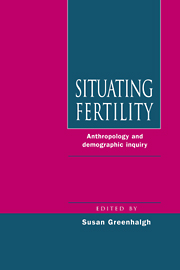Book contents
- Frontmatter
- Contents
- List of figures
- List of tables
- List of contributors
- Preface
- Conceiving reproduction: Trans-disciplinary views
- The social management of fertility
- 3 Agency and fertility: For an ethnography of practice
- 4 Invisible cultures: Poor women's networks and reproductive strategies in nineteenth-century Paris
- 5 The power of names: Illegitimacy in a Muslim community in Côte d'lvoire
- 6 Marginal members: Children of previous unions in Mende households in Sierra Leone
- Gender, class, and clan: The social inequality of reproduction
- Afterword: (Re)capturing reproduction for anthropology
- References
- Index
5 - The power of names: Illegitimacy in a Muslim community in Côte d'lvoire
Published online by Cambridge University Press: 07 December 2009
- Frontmatter
- Contents
- List of figures
- List of tables
- List of contributors
- Preface
- Conceiving reproduction: Trans-disciplinary views
- The social management of fertility
- 3 Agency and fertility: For an ethnography of practice
- 4 Invisible cultures: Poor women's networks and reproductive strategies in nineteenth-century Paris
- 5 The power of names: Illegitimacy in a Muslim community in Côte d'lvoire
- 6 Marginal members: Children of previous unions in Mende households in Sierra Leone
- Gender, class, and clan: The social inequality of reproduction
- Afterword: (Re)capturing reproduction for anthropology
- References
- Index
Summary
Except indirectly, in their general study of kinship and paternity, anthropologists have not contributed greatly to the problems surrounding the topic of illegitimacy.
(Alan Macfarlane 1980:72)An anthropology of bastardy?
Alan Macfarlane's reproach to his colleagues is not entirely unjustified. Notwithstanding several notable exceptions, anthropologists have been surprisingly silent on the subject, as compared to sociologists and, more recently, demographic historians. On the other hand, I wish to suggest that the relevance, both direct and indirect, of anthropology to the study of illegitimacy goes well beyond the “general study of kinship and paternity.”
The approach which has prevailed since Kingsley Davis' (1939) seminal paper on illegitimacy has been a normative one. Illegitimacy was to be understood as one type of deviant behavior. The epitome of such an approach is Goode's (1964:23) elaborate typology of types of illegitimacy, each defined by the precise type of norm which has been breached. Laslett (1980a: 1–2) has aptly criticized the somewhat naive functionalism of such writing. However, the problem is more deep-rooted. More recent attempts, by Laslett and others, to free themselves from this kind of functionalism have nevertheless, in important ways, retained the normative perspective. The problem lies with approaches which see illegitimacy as a direct function of sexual behavior.
- Type
- Chapter
- Information
- Situating FertilityAnthropology and Demographic Inquiry, pp. 108 - 129Publisher: Cambridge University PressPrint publication year: 1995
- 2
- Cited by



